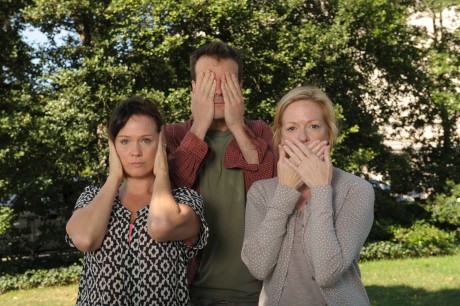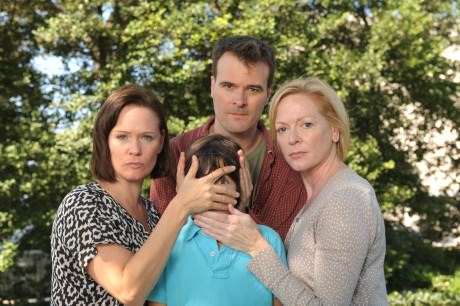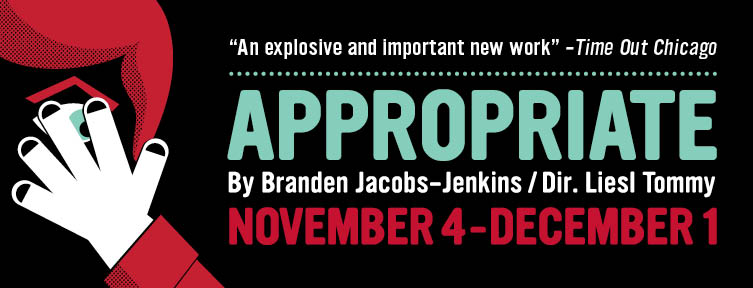Gearing up for the second show of the Woolly Mammoth Theatre Company’s 34th season, Appropriate, written by Branden Jacobs-Jenkins. Fitting into their season’s theme, “America’s Tell-Tale Heart,” the show focuses on unearthing secrets of an American family’s past as they come together to settle the estate of the recently deceased patriarch figure. I was invited to sit down with Director Liesl Tommy and pick her brain about the creative process and what it’s like being back at Woolly Mammoth for this project.
Amanda: What is it that draws you to this project in particular, and what is it about this work that makes you want to come and direct it here at Woolly?

Liesl: I think that first of all it’s extremely well written. Branden has a really amazing ear for dialogue. Actors just really love to say the words and whenever you get people in the room who are just having fun saying lines it always creates a fun energy in the rehearsal room. And you know that kind of excitement is so important because when you’re working on new plays it is very taxing to the actors because you’re getting rewrites all the time and you’re getting changes. They have to work really hard, they have to work three times as hard as if they had just an old finished play. If they can feel the quality of the writing it makes them that much more invested.
And then for me it’s just the subject matter. I can honestly say that no one is writing this kind of play right now. It’s so fresh and it’s really cutting edge. I’m always asking myself to be a rigorous young artist, is the work I’m doing 21st Century Art? Is it something that is new and worth people coming to the theatre – you know – leaving their television, leaving their Netflix, leaving their laptops…because there’s so much entertainment that they can have at their fingertips. So for me, if I’m going to work on it, it better be worth it. I feel like it definitely is because it’s something that no one is seeing in movies, no one is seeing in television, and no one is seeing in other theatres. That’s how fresh the material is to me.
How are you tackling the more provocative and taboo topics of this play?
Well it’s interesting because with a play like Appropriate— well, with all good plays, really – there are two things as a director that you have to think about. You have to think about the literal play that is happening; the literal words that people are saying to each other and what’s going on in the room. And then you have to think about the metaphor. That’s where the art part comes into directing. You have to analyze the text and think about what is the metaphor that the playwright is playing around with. Then my job is to make sure that that ephemeral art part of it, which is the metaphor, exists in the play as well. Without being obvious, just by creating that nuance of the unstated but present. And that’s what is so kind of wonderful about this play the literal part— the actual part of the play with people talking to each other and fighting about things, talking about family dynamic and talking about family history— it’s dramatic and painful and insightful. And then the metaphor which is about the history of race in this country, somehow is also present without us having to talk about it directly and that to me is awesome.
What is your overall artistic vision for Appropriate?
My vision for this show is really about how— and this is mine, this is nothing to do with what Branden has written it’s just one of the things that I think about a lot— the feral nature of humanity. And that is what I feel like the focus here is. When families are in crisis, how quickly things can become uncivilized. People say unbelievable things to each other and they do unbelievable things to each other; families will treat each other worse than strangers will. And they will cause pain in a way that no one else will cause pain. And to me that is just wildness, that’s uncivilized behavior; animal kingdom kind of stuff. One of the things that I feel is really beautifully explored is when we turn on each other in family death situations— how far we go, if we feel remorse, when we feel remorse, how much of it is self-serving and how much of it is genuine? Underneath human civilization we are animals and that wolf-pack dynamic is alive and well at all times. Death does funny things to people. So that is something that I just love exploring. It is so dramatic.
How does that artistic vision then fit into the concept of Woolly Mammoth’s 34th Season – “America’s Tell-Tale Heart?”
I feel like the tell-tale heart is that America has a pretty bloody and painful history. The reasons for the conflict that have existed are still existing today, they are pretty base and pretty feral. It’s not necessarily logical, its people grasping at self-interest. And to me that’s the tell-tale heart for the season and in this play. And in the conversation that the people of the world are having; that we’re trapped in. People are not on their best behavior, people are acting like wild animals out there.
Do you find yourself relating to the work personally?
Well for me I find it deeply affecting because I grew up in South Africa during apartheid and I am obsessed with conversations about race, conversations about the legacy of a complicated political history, and how societies deal with ‘dirty pasts.’ How denial can be as destructive as the initial destructive historical period; all of that stuff to me is fascinating. I come from a country that had catastrophe and upheaval and attempts to rebuild and so the questions of how you attempt to rebuild a society are always on my mind. What this deals with is like the failures and the successes of how this country dealt with its racial past. It’s because we didn’t didn’t deal with it then – we are still dealing with it now.
What has been the most challenging thing about directing this project?
I haven’t really had anything challenging so far. It’s been a joy. It’s been a delight. I have not yet had challenges. I hope it stays that way. It’s been thrilling. I mean working on a new play is always challenging because you’re getting new plays and reorienting things you’ve already worked on, but you know that’s part of the deal, and that’s not a surprise because it’s part of the job.

You are working with some young actors for this show. Do you enjoy working with young performers? What special challenges have you had working with them?
I’ve done it before, I’ve worked with kids a lot. I like working with kids because I think they’re fun. These kids are not that young, they’re like nine or ten, I think they’re supposed to be eight in the play. And I have a teenager, a sixteen-year-old girl in the show as well. And what I love about it is that it’s just so great to have three or four generations in one play, especially when we’re talking about family because everything feels so real. When we are with our families it’s like that so it just makes it feel that much more authentic. And that there are people who have been through hell in their lives, divorces and pain and then there are people who are brand new and fresh faced. That balance of how to preserve the innocence of the young people in your family, as well as deal with them; the harsh realities of being alive, is an interesting and fun thing to negotiate.
I guess one challenge is just working around the kids’ school schedules. That’s a challenge because I just can’t have them there whenever I want them. But the little kids basically just run around, bumping into things, knocking stuff over. They become an obstacle for the parents who are already super taxed in terms of what’s going on. Getting to watch the fun side of when people are good parents verses when they are not good parents. And that’s always entertaining because I think we can recognize it and it is a little embarrassing but at the same time you look at it with compassion. I think it’s a really smart way for Branden to use the kids in the play.
And the teenager, she brings that thing that all teenagers bring which is challenge and innocence, and also that bluntness. She asks questions that no one else is asking, because we think we know better. The actress in the room is the same. She brings that great notion we have “…oh, from the mouths of babes.” She just stated a thing that we should have known, but nope- we missed it because we were five steps ahead but she is all about being here in this moment. So having that is really fun.

What is it that you want audiences to take away from this production?
I guess the thing with this play, though I don’t have an agenda, is that I’m really curious about what audiences think they know about our shared history what they think they know and what they realize they don’t know in terms of ‘what in our shared history has a direct effect on our lives today,’ and what is just for the books, something that can be taught in a class. That is something that I think is always part of the struggle in this country because there are some people who are living with that history very closely and some people are not. And it creates a great big disconnect. And I think what this play is proposing is that it’s closer than we think it is. And I’m curious as to whether or not audiences walk away thinking that.
Do you think that the average theatre-goer will find this play relevant?
I think the show is going to feel very close to them in a lot of ways. It might be too close sometimes, making people a little uncomfortable. That’s part of what makes it great. There are many moments where I think people will say, “Oh, this feels so close I can’t watch it.”
Something that I really love exploring in my work is that combination of delicacy and rawness. As an artist I’m always thinking about those two sides and one of the things that I love about this play is that you can really explore both of those things -. the human capacity for compassion and its nuance set against the human capacity for destruction. It’s wonderful to be able to work on something that lets both of those things live together.
Appropriate opens on November 4 and plays through December 1, 2013 at Woolly Mammoth Theatre Company — 641 D Street NW, in Washington, DC. For tickets call the box office at (202) 393-3939, or purchase them online.





